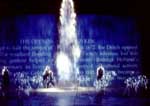
There may have been more consequential events at this summer’s Lincoln Center Festival, but Writing to Vermeer made the biggest splash – literally. At the end of this 100-minute opera, words by British film director Peter Greenaway and music by Dutch composer Louis Andriessen, gallons of water fell on the cast, cascaded off the stage, and (one hopes) narrowly missed conductor Reinbert de Leeuw and the musicians of the Asko/Schönberg Ensembles. The opera’s action takes place in the fateful year of 1672, and this spectacular liquid finale presumably represents a last desperate measure by Dutch patriots to stave off marauding French invaders by opening the dikes and flooding the countryside. The tactic worked, but it also ruined Holland’s economy, ended a century of prosperity, and brought bad luck to Jan Vermeer, that most cozily domestic of Dutch portrait painters, who died of a stroke after his own finances collapsed as well.
Other traumatic historical moments are depicted on the way to this final catastrophe: the crash of the tulip market, the gunpowder plot that destroyed much of Vermeer’s hometown of Delft, the bloody mob lynching of the treasonous De Witt brothers – even the accidental swallowing of varnish by one of the artist’s ten children. But, says Greenaway, all this is incidental to what he and Andriessen really wished to convey. Writing to Vermeer was actually intended to be a meditation on the painter (who never appears) as revealed in eighteen letters written to him and read to us by the three most prominent women in his life: his doting wife (Susan Narucki), wryly observant mother-in-law (Kathryn Harries), and chaste model (Barbara Hannigan). These chatty epistles are meant to reflect, at least in part, the idyllic nature of Vermeer’s paintings, which invariably depict women with dignity and respect as they go about their daily tasks.
Well, that is what we are told by Greenaway, not always the most sympathetic observer of women in his films and perhaps for a moment feeling a bit sheepish. I wonder, though. The stage is so busy that the gentler written messages as sung by the three women often seem to be drowned in lurid spectacle. Even the letters themselves are turned into visual coups as we watch them being written out on screens at the back of the stage or rolling over the steeply raked acting area. If Andriessen’s music accomplishes nothing in the way of character revelation or dramatic development, that’s because the text calls for neither. I did enjoy listening to the score as a musical abstraction – this composer has enriched his language considerably since he was labeled a Dutch minimalist, and one day I hope he writes a real opera. Here, for better or worse, he is little more than Peter Greenaway’s humble obedient servant in piling on one self-indulgent effect after another.